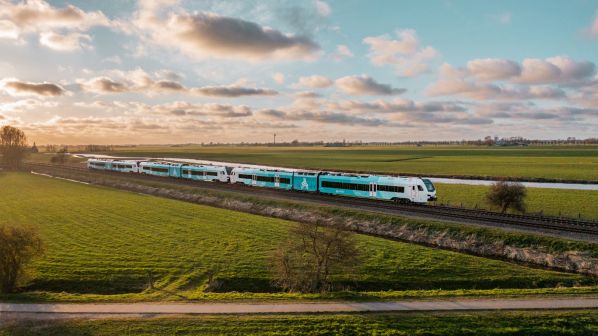ARRIVA Netherlands introduced 18 new Wink electro-diesel multiple units delivered by Stadler on services in the Dutch provinces of Friesland and Groningen on April 12.
Arriva is the launch customer for the 160km/h Wink sets, which translates from German as “convertible, innovative short train for local transport.” The trains were ordered under a €170m contract placed in 2017. The contract includes an option for six additional sets.
The 55.5m-long trains consist of two cars with a diesel power pack situated in between. The partial low-floor trains have 151 seats and operation is currently limited to 140km/h.
The powerpack consists of two Deutz TCD 16.0 V8 diesel engines, which operate on hydrotreated vegetable oil (HVO), a synthetic diesel fuel. This fuel will reportedly offer a 90% reduction in CO2 emissions compared with traditional fuel. In addition, a battery saves energy generated during braking, which can support acceleration and serve the train when the diesel engines are switched off.
There is also the potential to replace the diesel engines with larger batteries in the future, which would support Arriva Netherlands and Groningen and Friesland’s public transport authorities’ ambition to offer an emission-free service. A pantograph is already mounted to the top of the powerpack to support charging of batteries at stations and future operation under 1.5kV dc overhead electrification.
At some stations the height between the Wink sets and the platform deviates more than average. Dutch infrastructure manager ProRail is set to adjust the platform heights at Harlingen Haven and Deinum this year with plans to make adjustments at Sneek, Sneek Noord, Workum, Koudum-Molkwerum, Stavoren and Groningen. Arriva Netherlands will provide travel assistance at stations with a different boarding height free of charge with passenger requiring access required to register at least three hours in advance.
Stadler is maintaining the trains under a 15-year contract with Arriva Netherlands signed in 2018. Stadler has expanded its depot at Leeuwarden to accommodate the new trains.
For detailed data on fleet orders from around the world, subscribe to IRJ Pro.

